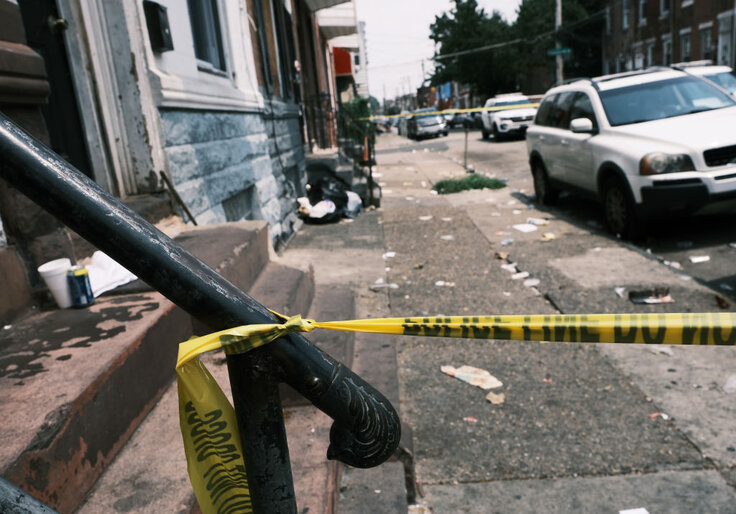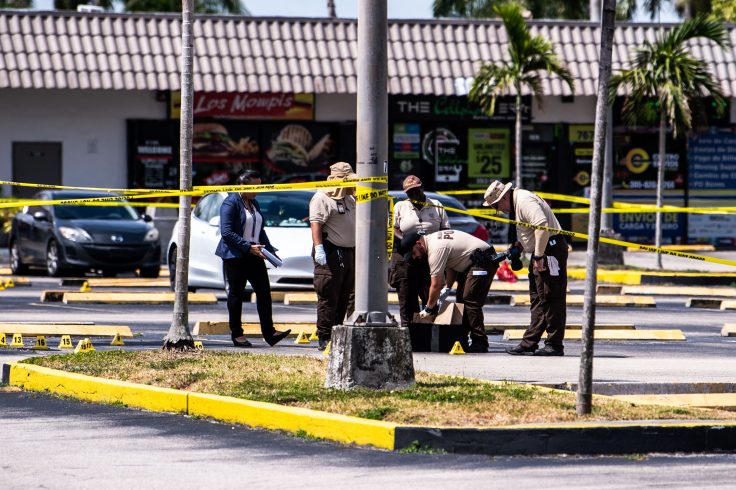THE REALITY OF THE STAGGERING EPIDEMIC BLACK CRIME TIDAL WAVE IN AMERICA!
BLACKS ARE 15xs to 30xs MORE LIKELY TO PERPETRATE VIOLENCE THAN WHITES.
Dr. Williams comments on another reality: that the rate of black homicide and armed robbery as well as other violent crimes are as is as much as 15–30 times more than whites
Blacks are also overrepresented among perpetrators of hate crimes—by 50 percent—according to the most recent Justice Department data from 2017; whites are underrepresented by 24 percent. This is particularly true for anti-gay and anti-Semitic hate crimes.
Why Can’t We Talk About the Murder Wave?
Two years in, pols and media still deny crisis, dodge role of defund and decarceration

During a weekly briefing last Monday, Philadelphia district attorney and prominent "progressive prosecutor" Larry Krasner sought to downplay the surge in violence his city has endured over the last two years.
"We don't have a crisis of lawlessness, we don't have a crisis of crime, we don't have a crisis of violence," Krasner said. "It's important that we don't let this become mushy and bleed into the notion that there is some kind of big spike in crime."
Those claims are at odds with the facts on the ground. Philadelphia has seen over 500 homicides this year, the most in 60 years; shootings, which began surging last year, remain well above pre-2020 norms. As former mayor Michael Nutter (D.) put it in a blistering op-ed, "I'd like to ask Krasner: How many more Black and brown people, and others, would have to be gunned down in our streets daily to meet your definition of a ‘crisis'?"
Krasner's comments, though, typify a rhetorical approach adopted by prominent politicians, think tanks, and the media amid a record surge in homicides across the country. Since murders began rising in the wake of last summer's anti-police protests, progressives have sought to discount or otherwise wave away the spike and conspicuously avoided discussing the role of the diminished criminal justice system. This wariness reflects a progressive fear of "tough on crime" rhetoric but is likely to cost them electorally—if it has not already.
Many have followed Krasner's approach, downplaying the surge as "just" a homicide spike. In June, for example, the Guardian published a "factcheck" of the "‘crime wave’'narrative police are pushing," insisting that the increase was really only in murders and adding that "Americans overall are much less likely to be killed today than they were in the 1990s, and the homicide rate across big cities is still close to half what it was a quarter century ago." A recent report from Democratic think tank Third Way similarly emphasized that "contrary to the media narrative, overall crime decreased in 2020 compared to 2019," only belatedly noting the record increase in homicides and gun violence.
Murders did surge in 2020, FBI data show, by roughly 30 percent, the highest one-year percentage increase on record. But so did aggravated assaults—a proxy for shootings—and carjackings. Early evidence suggests that things worsened over 2021: Among nearly 90 cities tracked by the data firm AH Datalytics, roughly two-thirds have seen homicides continue to rise in 2021. At least 12 major cities have already hit all-time homicide records, including 5 that have tied or topped records set last year. As Manhattan Institute senior fellow (and my colleague) Rafael Mangual has documented, dozens of smaller cities have seen the same record surge in homicides. In many jurisdictions, things are as bad as they were in the 1990s. In fact, if trends continue, the AH Datalytics data suggest, 2021 will see the most big-city murders since 1995.
A host of factors are likely behind this spike, but a leading contender is the decrease in policing capacity, manpower, and morale following last summer's anti-police protests and riots in the wake of George Floyd. Many big cities experiencing big homicide spikes have also reported a dramatic drop-off in police staffing, as cops flee for less hostile employers in the suburbs. Court closures and a massive reduction in daily jail populations likely also contribute, further reducing the capacity of the criminal justice system to identify, detain, and prosecute serious offenders.
But political leaders, aided by the media, have downplayed or ignored the role of these changes. In November, the New York Times cited "dozens of interviews" with "criminologists, city and state officials and people close to murder victims," all of whom "could not name a single, direct cause of the spike in homicides" except possibly "the continued destabilizing effects of the coronavirus pandemic." Recent Washington Post coverage of rising homicides in D.C. gives the police unions a hearing but lets city officials get away with attributing the increase to illegal guns and pandemic interruptions. Axios Chicago similarly linked the city's surge to illegal guns, a standard but dubious talking point of Chicago's various Democratic mayors.
Krasner's assertion that "it’s important that we don't let this become mushy and bleed into the notion that there is some kind of big spike in crime" represents a longstanding sense among progressives that tough-on-crime rhetoric, combined with an "if it bleeds it leads" ethos at major publications, contributes to public misconceptions about the crime level, in turn fueling political support for policing and incarceration. But a commitment to the obverse—depolicing and decarceration—seems to have encouraged leaders like Krasner to insist there is no reason to be worried, even when there is.
Such denialism is likely to play poorly in an electorate where more than three in four voters across all parties say violent crime is a "major problem." Republican Glenn Youngkin used rising crime rates against Democratic opponent Terry McAuliffe in his successful bid for the Virginia governorship this past year. Particularly if murder rates continue to rise, Republicans are likely to take the same tact in the coming midterm elections next November—with potentially disastrous consequences for Democrats.
Charles Fain Lehman is a fellow at the Manhattan Institute and a contributing editor to City Journal.
Pizzeria owner knocked unconscious while breaking up fight, North Carolina video shows
Mike Scotto di Frego, co-owner of Brother’s Pizzeria, was attacked and knocked unconscious in his restaurant on Dec. 5., surveillance video shows.
As a single dad and a business owner, violent interactions aren’t something he can risk, he said on the restaurant’s Facebook.
“I got (jumped) and stomped out til I was unconscious,” Scotto di Frego said. “I have two boys, I’m a single dad. I don’t need this in my life.”
Scotto di Frego was punched by another individual when he moved to break up a fight between two girls, he said. Police informed WGHP that the incident happened around 2:30 a.m. Dec. 5.
“There were two different patrons with tables in there and somehow an argument started and then, from the argument, a fight began, and then the business owner tried to break things up and he was assaulted,” Winston-Salem Police Sgt. Kevin Bowers told the news station.
According to Scotto di Frego’s account of the incident on the pizzeria Facebook page, he was still reeling from the attack the next day and working to figure out what exactly happened. After receiving dozens of supportive comments online, he posted a photo of his face, bruised and swollen, but healing.
In the restaurant surveillance video submitted to news outlets, viewers can see Scotto di Frego attempt to speak to customers walking by him toward a group of people in the back of the restaurant. The video shows one man come up behind Scotto di Frego and hit him in the side of the head, causing him to fall into a booth. The same man appears to stomp on him once he has fallen down, the video shows.
Following the incident, Scotto di Frego and his business partner decided to permanently close the restaurant early at night in response to violence in the pizzeria.
“I’m sorry to announce this, but due to recent incidents in the store we will no longer be open late nights,” they wrote. Now, their restaurant will begin to close at 10 p.m. except for Saturday, when it will close at midnight. It will cost them money, the pizzeria told News & Record, but it’s not worth the risk.
Merchants told the outlet that officers on downtown patrol are off by midnight, leaving a scarce law enforcement presence by the time late-night venues close.
“It’s no secret that we can use more people,” Bowers, the longtime supervisor for the downtown bike patrol, told the News & Record. “Every department could.”
Kira Boyd, spokesperson for the Winston-Salem Police Department, told McClatchy News that safety concerns for downtown business owners are a priority for the department.
“We encourage citizens to report any crimes they witness in our city,” Boyd said. “We will be meeting with a group of business owners soon to discuss ways we can partner to keep their patrons and our citizens safe.”
If citizens have any information about the incident, they are asked to call the Winston-Salem Police Department at 336-773-7700.


No comments:
Post a Comment